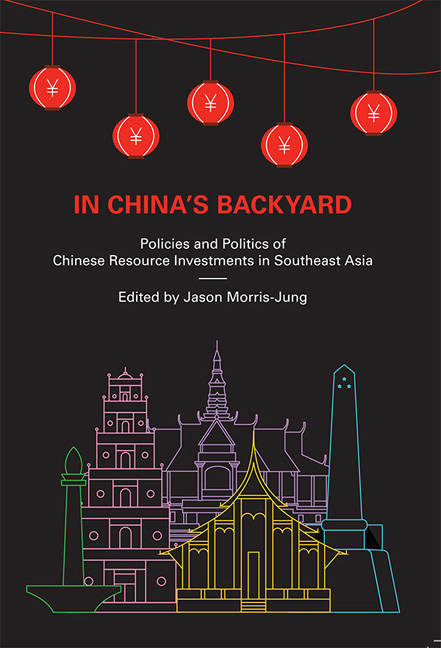Book contents
- Frontmatter
- Contents
- Foreword
- Acknowledgements
- About the Contributors
- 1 Introduction
- 2 Mixed Motivations, Mixed Blessings: Strategies and Motivations for Chinese Energy and Mineral Investments in Southeast Asia
- 3 Mineral Resources in China's “Periphery” Diplomacy
- 4 Energy Entanglement: New Directions for the China–Indonesia Coal Relationship
- 5 Indonesia–China Energy and Mineral Ties: The Rise and Fall of Resource Nationalism?
- 6 The Direction, Patterns, and Practices of Chinese Investments in Philippine Mining
- 7 Development Cooperation with Chinese Characteristics: Opium Replacement and Chinese Rubber Investments in Northern Laos
- 8 The High Cost of Effective Sovereignty: Chinese Resource Access in Cambodia
- 9 Complex Contestation of Chinese Energy and Resource Investments in Myanmar
- 10 Anti-Chinese Protest in Vietnam: Complex Conjunctures of Resource Governance, Geopolitics and State–Society Deadlock
- 11 Complexities of Chinese Involvement in Mining in the Philippines
- 12 Conclusion
- Bibliography
- Index
5 - Indonesia–China Energy and Mineral Ties: The Rise and Fall of Resource Nationalism?
Published online by Cambridge University Press: 04 July 2018
- Frontmatter
- Contents
- Foreword
- Acknowledgements
- About the Contributors
- 1 Introduction
- 2 Mixed Motivations, Mixed Blessings: Strategies and Motivations for Chinese Energy and Mineral Investments in Southeast Asia
- 3 Mineral Resources in China's “Periphery” Diplomacy
- 4 Energy Entanglement: New Directions for the China–Indonesia Coal Relationship
- 5 Indonesia–China Energy and Mineral Ties: The Rise and Fall of Resource Nationalism?
- 6 The Direction, Patterns, and Practices of Chinese Investments in Philippine Mining
- 7 Development Cooperation with Chinese Characteristics: Opium Replacement and Chinese Rubber Investments in Northern Laos
- 8 The High Cost of Effective Sovereignty: Chinese Resource Access in Cambodia
- 9 Complex Contestation of Chinese Energy and Resource Investments in Myanmar
- 10 Anti-Chinese Protest in Vietnam: Complex Conjunctures of Resource Governance, Geopolitics and State–Society Deadlock
- 11 Complexities of Chinese Involvement in Mining in the Philippines
- 12 Conclusion
- Bibliography
- Index
Summary
Energy relations between China and Southeast Asian countries have extendedfrom energy trade cooperation to equity investment and infrastructureconstruction cooperation in recent years. However, several factors arepushing some Southeast Asian countries toward resource nationalism andprotectionism. Local politicians and general public reportedly are concernedof China's ambitious plans for energy resources exploitation in SoutheastAsia. This chapter examines different concerns of and responses to China'senergy resource related investments in Indonesia, and demonstrates thatthe actual impact of Chinese energy investment depends not only on China,but also on the recipient country's domestic politics, regulatory system andstate capacity.
Introduction
Indonesia is rich in energy and mineral resources and it has allowed foreign companies to explore and exploit its oil and gas reserves sincethe early 1960s. Chinese national oil companies (NOCs) have long demonstrated interest in Indonesia's energy resources and they have developed many oil and gas exploration projects there. After the global financial crisis in 2008, China accelerated its foreign direct investment (FDI) to Indonesia and, for the first time, China was among the top five countries for levels of FDI to Indonesia in the last quarter of 2014. This may elevate energy cooperation to a new level.
However, although Chinese government has planned to stake a long-term strategic energy investment in Indonesia through a range of policy incentives and Chinese capital has poured into resource and energy-related infrastructure sectors, emerging factors have been pushing the two countries’ energy ties toward difficulties and competition. Concerns in Indonesia that an increasing trade deficit with China will affect national economic security have stirred debates over how to protect Indonesian resource and mineral industries while maintaining trade ties with Beijing. Fearful of falling into a relationship of “dependency development” with China or other foreign mineralinvesting country, Jakarta implemented a new law banning the export of unprocessed ore in January 2014. Although the law aims to increase added value for mineral resources prior to export, the new regulations will affect Sino–Indonesian energy resource cooperation. Within this context of fraught political and economic relations, this chapter addresses the following questions: In what direction is the China–Indonesia energy tie going — towards cooperation or conflict? And can it provide a basis for a broader bilateral relationship?
Overview of the Indonesian Energy Sector
Historically, Indonesia has been an attractive country for mineral investors because of its rich mineral wealth.
- Type
- Chapter
- Information
- In China's BackyardPolicies and Politics of Chinese Resource Investments in Southeast Asia, pp. 104 - 128Publisher: ISEAS–Yusof Ishak InstitutePrint publication year: 2017

